#analysis by len
Text
I’m really surprised how few people are talking about the autistic subtext in I saw the tv glow. I feel like so much of this movie is about what it’s like getting lost in a hyperfixation. It’s about feeling like you’re not meant to exist in the world you’re in because it wasn’t built for you. It’s about how sometimes fictional characters will do more for you than the people in your real life. It’s about having a meltdown in public and everyone ignoring you because they see you as crazy and beyond help and then having to apologize for it. It’s about feeling more real in a world that only exists in your head, no sees you for you, no one understands exactly what you are. So much of this movie is about disability and mental illness and how isolating those experiences can be. I’m screaming.
#i saw the tv glow#actually autistic#this is not to dismiss the trans subtext of course#I just think that analysis of this movie isn’t really complete without looking at it through the lens of disability
756 notes
·
View notes
Text
man laios and toshiro's/shuro's dynamic is incredibly compelling to me on multiple levels
when you look at them, you can see the cultural and personal barriers that drive almost every single aspect of their relationship, both positively and negatively. laios is incredibly outspoken and driven by his passions, which he expresses freely even in the face of annoyance and/or criticism- he's allowed to be as authentically himself as he pleases, and it's this drive that allows him and the others to survive as long as they have, especially due to the fact that these passions and interests are intertwined with his skills as a dungeon diver. toshiro, in contrast, is incredibly reserved, not only due to his eastern upbringing but also his status as nobility- a combo of cultures that both demand that one save face, to avoid conflict at any cost, even at the expense of one's own feelings and individuality. this, in turn, has made toshiro the perfect samurai, as he's politely-spoken, agreeable, and an honorable, skilled man. both are also incredibly devoted to falin on different levels, having come to accomplish the same mission of her rescue despite drifting apart from the party.
on the flipside, it's these same strengths that cause them to clash- laios is outspoken but unable to truly decipher the emotions of others, leading to a lot of false assumptions and frustration from those who interact with him. toshiro is stoic but to the point of complacency, leading to a aggressively neutral disposition that's ushered by the needs and wants of others, rather than himself. neither man truly knows where they stand with the people important to them in their lives, and hold the ones that they do know how they feel with a fierce admiration expressed in ways that aren't always traditional.
in the end, they both share a growing feeling of isolation from other people that comes to a head when they meet again in the depths of the dungeon, and they both have different ways of coping with the frustrations that arise, seeing the other as only the things they have seen face to face.
it's laios' ability to express himself emotionally without consequence that sparks jealousy in toshiro, leading to a physical fight born out of miscommunication and envy. while toshiro is a driving force in the conflict, it should be noted that the actual fight is started by laios, breaking the dam of indirect communication through force. nothing is more direct than a slap to the face, and it's only after they start hitting each other that toshiro's true feelings come to light.
however, at the end of it all, toshiro is the one who stops torturing himself, listening to laios and giving him the bell, allowing laios and his party entrance into his homeland should they need it, and ultimately giving him support in his mission to defeat the dungeon mage, albeit in his own way. despite it all, they're still good friends with a conflict that boiled over, but came out the other end with a slightly better understanding of each other. the fight was painful for both of them, but it was a necessity for their dynamic to improve, and for them to be made aware of their faults and improve as individuals as well.
but also, if you think about it, their dynamic is literally just this

#dungeon meshi#delicious in dungeon#laios touden#laios dungeon meshi#toshiro nakamoto#shuro#shuro dungeon meshi#character analysis#anyways toshiro haters with surface level takes get the hell off my lawn boy#i hope you know this entire character analysis was born out of the realization that i'd seen this dynamic before in a different light#and i thought. man. what is the funniest comparison i could make here rn. and i'm still right abt it btw#oh yeah also of course the autism read is still there#as an autistic person myself they don't read at all like neurotypical v autism. they read a LOT more like autism v autism#you know how people with autism either get along REALLY well with other people with autism or repel each other with a force#yeah they're basically that. to me#reading toshiro as autistic with the immigrant lens btw makes him even more compelling to read that way#but that is an analysis for another time#man i missed writing these#dungeon meshi spoilers#i should tag this actually. bc i’m right#laishuro
382 notes
·
View notes
Text
The Gender Narrative - from Buffy the Vampire Slayer to A24
Alright so I know this topic has probably been explored to hell and back (pun intended), but a transgender lens reading of Buffy the Vampire Slayer has beckoned me for years; and seeing I Saw the TV Glow yesterday was probably the last push I needed to get this out in writing. As we know, the film features a fictional television show heavily inspired by BTVS - and the framing highlights the same aspects I've wanted to dissect, so let's dive into it.
Spoilers under the cut!
Throughout its run, and despite its imperfections, BTVS drew much of its messaging from 90s (and early 2000s)-era feminism. Buffy's presentation as a sparkly, pink, girly girl is central to her character and her destiny. She is an icon of what girls can do and accomplish, even with the whole world against them - and, in this context, it is absolutely, startlingly captivating that her personal life revolves around a perpetual struggle for her right to girlhood.
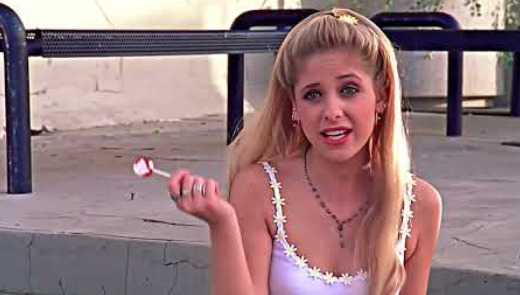
Despite being the picture-perfect blonde Valley Girl on the surface, Buffy often finds herself barred from that existence by her Slayer identity. She is consistently perceived as too strong, too capable, too aggressive, too independent, too dangerous - and, ultimately, too masculine to participate even in the most stereotypical milestones of a girl in high school. Still, that experience is what she craves the most; so she signs up for the cheer squad, she loves shopping, she runs for Prom Queen, and she goes out slaying in a halter top, with perfect bouncy curls. In essence, Buffy Summers is desperate to pass - which takes us to ISTTG and the root of its story.
The two main characters of ISTTG - "Owen" and "Maddy" - are obsessed with a popular YA series, The Pink Opaque; which, between its credits font, its girl power themes, and monster-of-the-week format, is demonstrated to be an in-universe parallel to BTVS. The Buffy equivalent - or, the pink, pretty, sensitive, and powerful Isabel - is a point of utter fascination for "Owen."
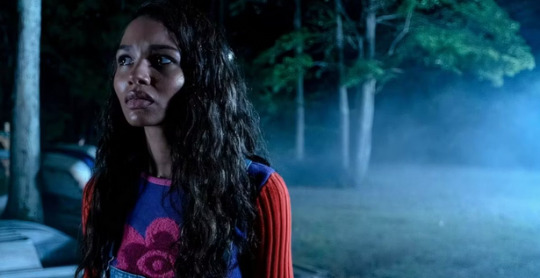
there are no good stills of her online yet please forgive me
She is everything he wants to be, everything he is meant to be; and the time he spends with "Maddy", wearing a pink dress, a pink ghost drawn on the back of his neck, the pink glow of the TV vivid on his face, is the only time he feels anything approaching to happiness or peace. The very first sequence of the film establishes that "Owen" barely responds to his own name, that his father is a walking threat of what society commands him to become, and that his mother is loving but distant. Even later on, when he apparently has a "family of [his] own", we never even see their faces. Within the context of his life, he is little more than a ghost, going through the motions; and as the story goes on, it is revealed that "Owen" is Isabel, trapped in a false reality by Mr. Melancholy, the Big Bad of TPO. Her heart was carved out, she is drugged, and buried alive; and the sound of her slowly choking to death overlays "Owen's" steadily worsening asthma.
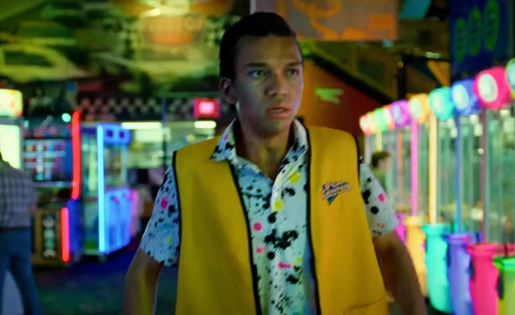
There is no denying the truth of that alternate existence by the end of the film. "Owen's" life is a nightmarish suffocation. Isabel is dying from a life of a boy she never was - in what is, explicitly, a transgender narrative.
The same story is directly mirrored by "Maddy."
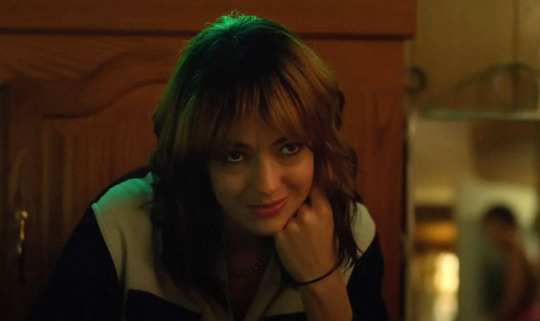
Within the premise of ISTTG, she is the similarly trapped and suffocating "Tara"; or, the second half of the Pink Opaque - who, over the course of the film, discovers the truth of their reality, returns to the world of the TV show, and then comes back, unwilling to leave Isabel behind. However, what is particularly notable is that while her character's name is, of course, an homage to Tara Maclay (made all the more obvious via Amber Benson's cameo), the "Tara" of TPO is nothing like the soft-spoken, pastel-wearing witch.
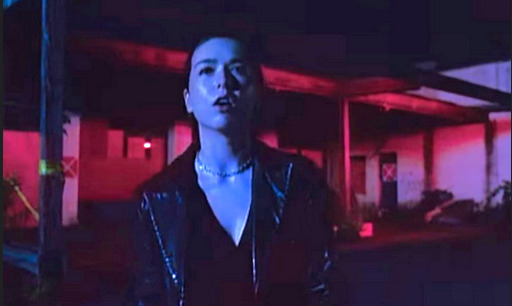
Instead, she is a bold, loud punk with slicked-back hair and a leather jacket, who snarks at the monsters-of-the-week and speaks in poetry - she's Spike; and that provides the basis for her dynamic with "Owen" throughout the film.

In the world of BTVS, Spike is largely presented as a foil to Buffy's character. He is her thematic (and extremely sexually compatible) opposite; and that extends to his own relationship with gender. His story arc is defined by his struggle to be perceived as a man; on the Watsonian level, it is an identity persistently overshadowed by his vampirism - and in the Doylist sense, his poetry, occasional eyeliner, and painted nails might have something to do with that situation. Regardless, it is a significant factor in his narrative, both before and after his original, human death - to the point where he bonds with Buffy's mother, Joyce, specifically because she "treated [him] like a man"; and in the context of ISTTG, the same themes extend directly to "Maddy." In S5:Ep7 of BTVS (Fool for Love), Spike states that "getting killed made [him] feel alive for the very first time" - and when "Maddy" returns from the world of TPO, she explains that the only way to survive what Mr. Melancholy had done to them was to bury herself alive and die in the false world. Her statement is a monologue of slam poetry, spoken without interruption and illuminated by the steady blue of a high school planetarium; and while "Owen's" experience of blue lighting is usually aggressive and abrasive, "Maddy's" is soothing. It is right. It ties directly to what she is meant to be, even as her story inevitably terrifies "Owen" - who, much like Buffy, is not yet ready to face the truth of who he is or allow himself to indulge the desires he's buried for all his life.
From what I understand, the finale of the film has proven to be divisive; some interpret it as hopeful, others as crushingly bleak - but as a BTVS fan, and a trans man myself, I cannot see it as anything other than a peak of sheer, overwhelming panic that is only experienced at the very precipice of Change. My reason for it is rooted in the parallels between the respective season 5 finales of BTVS and TPO. For Isabel and "Tara," the story ends with their apparent defeat at the hands of Mr. Melancholy; and Buffy's ends with her sacrificing herself to save the world. She dies. She is buried. And then there's season 6. As such, inevitably, "Owen" is going to accept the truth of himself; he is going to die, Isabel is going to claw her way out of a grave - and when she does, only one person is going to understand what happened.
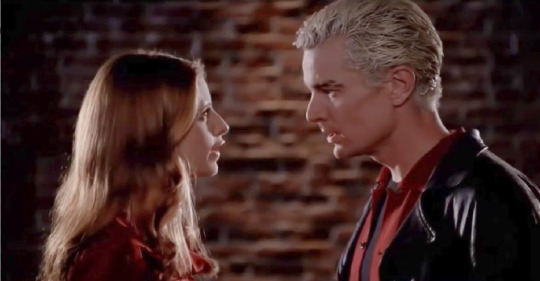
In conclusion - they are T4T. To me. And to Jane Schoenbrun, I suppose.
#i saw the tv glow#buffy the vampire slayer#isttg#i saw the tv glow spoilers#i saw the tv glow analysis#btvs#spuffy#spike btvs#william the bloody#buffy summers#film analysis#jane schoenbrun#a24#a24 films#a24 movies#btvs spike#btvs rewatch#queer film#queer lens
197 notes
·
View notes
Text
Unpopular opinion, but I really do not see Dany as this "oh so tragic" and "oh so full of trauma" character. She has bad things happen to her like every other ASOIAF character, but she isn't really super traumatized or unable to deal with what happens in her life, and the tone of her story isn't really one of tragedy: on the contrary, her story is full of her overcoming hardships. It's full of triumphs. Even the low point she hits at the end of ADWD is just setting up her journey to finally crush the slavers and become the Stallion who Mounts the World. And then when she goes to Westeros, she will be one of the people to defeat the Others.
I find it a little bit annoying when I see people reading her character purely through the lens of "oh she suffered to much, she was raped by her husband, she was abused by her brother, she doesn't have a home, she is so tragic, etc" (I'm not saying people can't discuss these topics, by the way, I'm just saying that it annoys me when this is the ONLY thing people talk about when it comes to Dany). First, because this isn't the majority of her story, this is mostly part of her early story or backstory, and the main part of her story are the things she does after that, her triumphs and hardships trying to lead her people, fight a war, fight the status quo, and so on. It's a little annoying to see a character who has such a great complex political and magical storyline, a great adventure, all be reduced to "she is just an abused girl who suffered", with all other aspects of her story being ignored. But most importantly, I think this reading of Dany as this tragic character, by Dany stans and Dany haters alike, gives fuel to a bunch of other annoying readings of her character: the neutrals use the "oh so tragic" narrative to argue that her story has to end with her dying and she has nothing else to contribute to the main story other than sacrificing herself and be a tragic hero. Meanwhile, the antis use the "oh so tragic" narrative to claim that they sympathize with Dany, but her trauma is going to make her crazy, paranoid, a villain, etc. Or, when they don't say that her trauma is going to make her a villain, they claim that she was always a villain and use her "trauma" to claim that they sympathize with her and that her "trauma" makes her such a complex villain.
#daenerys targaryen#daenerys defense squad#rambling#and tbh this isn't just dany or the a/soiaf fandom#this tendency of seeing every character out there through the lens of trauma is something i find annoying#i'm not saying people can't discuss trauma btw#but it seems like sometimes people don't do any other character analysis or plot analysis in fandom#other than debating who's the most traumatized#anyway i hope people don't hate me too much for this post#also i guess that one thing that annoys me the most is people completely ignoring dany's political storyline#and her arc of learning to rule#in favor of pushing this idea that her story is just meant to be a tragedy
155 notes
·
View notes
Text
forever thinking about how the long quiet embracing their full divinity involves The Voices coming back. like yeah being plural is basically the same thing as being a godi'll cosign that
#in all seriousness though#its fascinates me that the Shifting Mound's ascension was her folding all the Vessels back into herself#she refers to the things that happened in their routes as having happened to her#and uses the singular first person at all times#whereas the Quiet and the Voices all maintain separate agency and perspectives#even after their ascension they speak in plurals about themselves; “we're the house now” etc.#they recognize their actions as collective “why did *we* throw the knife out the window” etc.#but still trace them to separate origins “it was his idea”#i know i read EVERYTHING as plural but i cant help but take a plural lens on this#in which case its fascianting that the Shifting Mound's ascension is facilitated by integration#while the Long Quiet's is in some senses a fragmentation#and viewing the Shifting Mound's awakening as integration adds some fascinating wrinkles#like the Adversary and the Eye of the Needle explicitly RESISTING it#woops i wrote all the serious analysis in the tags again#the long quiet#the shifting mound#stp voices#slay the princess#stp spoilers#slay the princess spoilers
154 notes
·
View notes
Text
i love you stories where the narrative device becomes a theme of its own, i love you magnus archives “who is listening?” tape recorders, i love you interview with the vampire “how does memory warp?” interviews, i love you house of leaves “this film never existed and yet the minotaur hunts me” academic dissertations, i love you i love you i love you—
#the magnus archives#interview with the vampire#house of leaves#a story’s medium not as representational but inherently and monstrously transformative#everything is a lens is a lens is a lens but some warp deeper than others#when the weft and weave of the story becomes its own character and that character is the villain#horror#analysis
168 notes
·
View notes
Text
do you know how fucking mad it makes me that the hilltop hole in reality and the panopticon tower can feasibly be read as yonic and phallic symbols of power. can you understand the level of rage I feel.
#the web is gendered as feminine and primarily uses a female avatar and the panopticon is the seat of power for two men#the web and the reality hole exert power through seemingly small secret passive acts of manipulation#whereas the panopticon represents a huge domineering and ultimately weaker display of control#the fucking. words annabelle uses to describe it like 'aching hole' or whatever#this holds up as a lens of analysis and I hate it so much. hashtag feminism I guess.#tma#marina marvels at life
2K notes
·
View notes
Text
ok so. forgive me for a second but i've been abnormal about skizz and ren since the hiatus between third life and last life and holy shit this season is already not helping.
let's talk about skizz, ren, undying loyalty, and golden apples, shall we?
so the thing that you need to understand about skizz is that he is loyal to a fault. impulse literally says this exact thing about him in limited life, and skizz himself says himself: "you know me and my factions, i never turn." the second thing is that the first person their loyalty manifests for in third life is ren. he and ren run into each other on the second night when ren is getting accosted by mobs outside skizz's door and skizz gives him a place to stay the night. ren decides to trade skizz for his leather, for the upcoming enchanting buisness, and gives skizz a golden apple in exchange. skizz thinks this is wildly more than he deserves but is very thankful. skizz doesn't say it here, but this is the moment he swears his loyalty to ren.
throughout third life, he is willing to do or get basically anything for ren. the two of them literally die together to the tnt trap. when ren dies on the alter and everyone thinks martyn betrayed him, skizz is the first person to get there in the morning. he's in half broken gold armor and borrowed tools from bigb and he still tells ren "get behind me", still tries to protect him from martyn. when skizz is on red, he goes a bit crazy, but he channels that bloodlust into protecting ren. he kills jimmy in the red desert, he kills cleo when she tries to attack ren, he chases down impulse when he betrays dogwarts and dies trying to kill him.
when skizz dies in third life, he's got an unused golden apple in his hotbar. after he dies, he remembers the first time he met ren, etho, and martyn, and he spends quite a bit of time on his memory of ren and ren appears in his first memory of etho. after he dies, ren wields a blade named in his honor.
skizz spends third life loyal to ren- he dies for him and he dies with him.
in last life, ren and skizz end up on completely different sides, and it very quickly gets bad because when ren becomes boogey, he kills skizz. he lures him into a trap. he tells skizz he loves him. skizz literally says "i am broken hearted" when ren kills him. ren holds no regard for the relationship they used to have and yet skizz cannot help but compliment ren's skill with the trap, outright says he can't be mad at ren.
and then it only gets worse because skizz tries to storm ren's tower with impulse after they've gone red. and that! doesn't go well! and while skizz is retreating, while he is eating the golden apple in his hot bar, ren shoots him dead.
and that is the last time they've spoken. two years ago.
because skizz isn't in doublt life. and ren isn't in limited life.
and when skizz's time comes in limited life, he ensures he doesn't have a golden apple in his inventory this time. this time, he hands the apples off to his teammates, where he knows they will go to good use. and then he hands etho a diamond fucking axe (red winter is coming) and asks him to execute him for the sake of their alliance. ok! sure! fill ren's role more explicitly, why don't you!
and that first session of secret life genuinely only made it worse. when skizz is talking to tango and cleo about their alliance, skizz says he wants to give leadership over to someone else: "i want to be more of a soldier than a leader this time." cleo says she'll fill the roll of leader- she doesn't take orders well - and then seals their alliance by giving tango and skizz a golden apple each. because of course she does.
and well, we all know that didn't really work out, so that's one person off the list that skizz can fill the dogwarts shaped hole in him with, so then he goes to bdubs. he says he'll lay his sword at bdubs' feet. he says he'll win bdubs with his loyalty. he calls bdubs "my leige", jesus christ dude, you couldn't be less subtle unless you straight up called him ren's name.
skizz has been (whether accidentally or on purpose is up to you) trying to recreate the experience he had with dogwarts, and particularly what he had with ren, since the moment dogwarts fell. he can't have it with ren because he missed his only chance in last life, so he'll fill the void with whoever he can. his fellow soldier. ren's successor. ren's new kingmaker. anyone. and it's never gonna work. i need ren to come back for like, 900 reasons, but i especially need him to come back so skizz can have a shot at making it to spring.
#secret life spoilers#life series spoilers#skizzleman#rendog#secret life#my writing#analysis post#(not really. ill be real this very much veers more into summary territory than i would like for an analysis post.)#(but i like it enough to put it in that tag anyways)#renskizz#(is that their ship tag???)#(you dont have to read this through a shipping lens it should just be known that that *does* color how i think about them)#anyways. training montage by the mountain goats skizzleman song of all time.#“i'm doing this for revenge/i'm doing this to try and stay true/i'm doing this for the ones we had to leave behind/i'm doing this for you”
515 notes
·
View notes
Text
Bruce is actually really attractive, and I have enough reasoning to make a list
He's:
Tall (. Tall enough to hit his head on the vault doorframe)
Long-legged
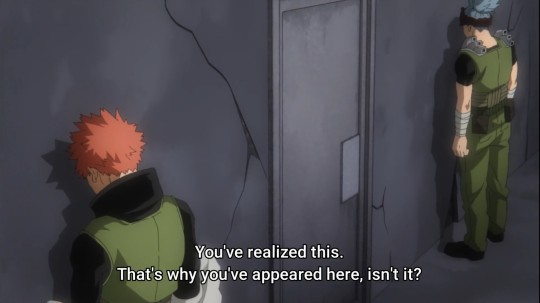

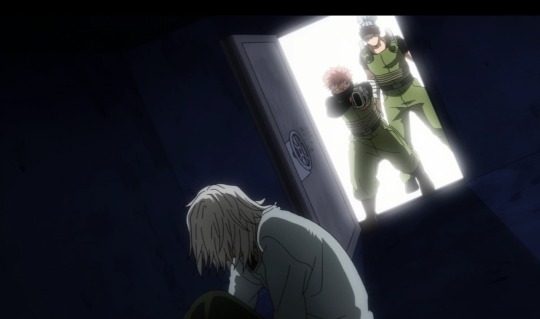
Has a straight nose bridge
Has high cheekbones (more noticeable in 2nd pic below)
Has a strong jawline
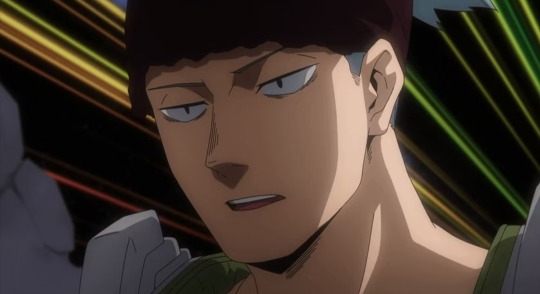
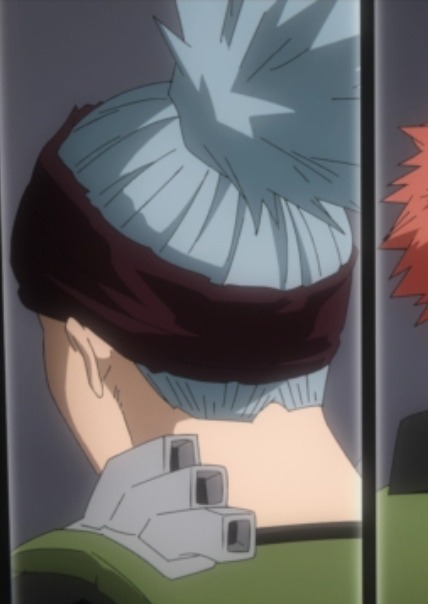
Sharp eyes, but they aren't small (plus eyebags if you're into that)
Overall, he has strong, attractive facial features
Has broad, refined shoulders. You can tell he works out (or he did, when he was alive)
Even has a thick, muscly neck
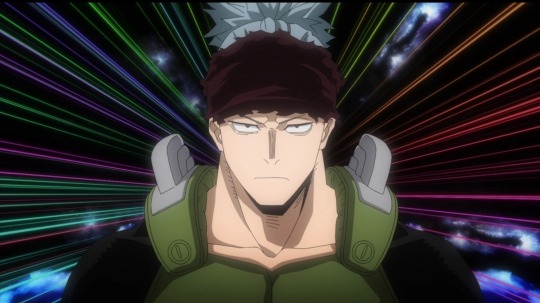
He has MUSCLE. Is SCULPTED. NOICE. VERY NOICE. (nice arms. Nice shoulders. Nice neck. Nice legs. Nice butt-)
(There are actually panels where you can see some of his muscles. Other than those already shown here, he's got bricky thighs-
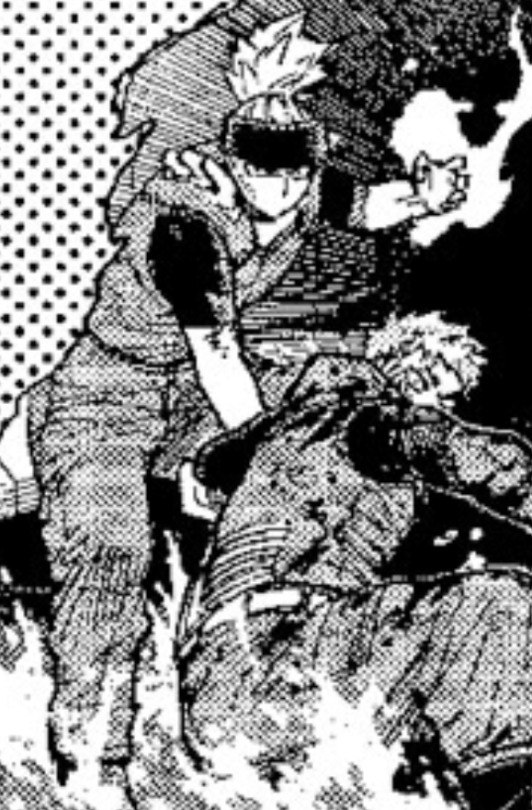
-and in the panels where we first get his name dropped, he's got those shoulder blades too-)
The one time we see him smile, and he actually has a scary one
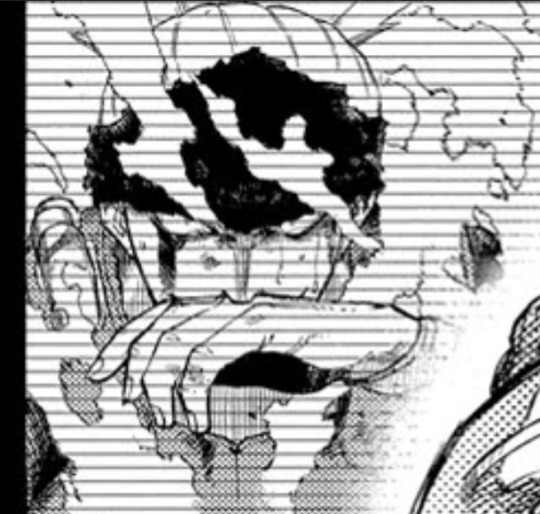
Has small, kinda sharp pupils, and his eyes remind me of a cat. We only ever saw him tense or defensive, so his resting/listening face is really cute
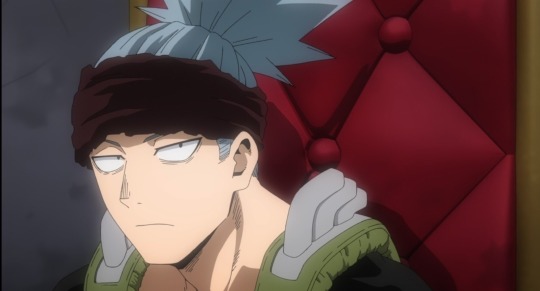
Other than the physical appearance stuff, he also:
Takes shit without batting an eye (patience, knowing it's just how Kudo is, etc)
Kudo being all "Cut the crap Bruce and give it to me straight", after Bruce tests his blood and is rightfully Concerned because they just faced AFO
Put up with Kudo's experimenting and testing over Yoichi's transferable Factor
Did ya'll see the look on Kudo's face when he realized he had Yoichi's Factor/will? Kudo was going to start in nonsense and Bruce just dealt with that.
Also something I noticed when looking back at the images here; Bruce has bandages on his arms in the void. But not when he faced AFO in the sewers.
Were he and Kudo cutting their arms open in their experimenting over Yoichi's theory? Is this why Kudo has two gauntlets instead of his one? Why we never see his bare arms in the void? That he always keeps his arms down so there's no slip?
Is smart enough to run blood tests, plus has enough common sense to pick Shinomori as his successor
He picked a guy who avoids society, has an Ability to detect danger so he can always stay away from AFO, is also a coward so he's never going to go throw himself into danger, even without knowing instinctively he stands no chance, etc.
Meanwhile, Kudo chose Bruce, who he played Hot Potato Yoichi with; but he did also trust Bruce, and put the only pure combative Ability in OFA through Bruce.
These two made their choices based on what they valued and saw the Factor needed.
Is logical, analytical, and calm.
He tried advising Midoriya on their Abilities in One For All, especially his own.
Midoriya then tried ignoring him about using Fa Jin for the first time, but found he was right, thinking: "Dammit!! I had [Lady Nagant] right where I wanted her, but... ugh! The Third was right. My parallel Quirk processes are all screwed up!" (ch. 314).
Plus, when Midoriya fixed his processing mistakes, Bruce was analyzing the way he reached his new conclusion. Pure facts, no bias, very calm, just saying it as it was.
We never see him panic. When he's caught by surprise in the sewers by AFO, Kudo, and Yoichi's little bubble event, he immediately reacts. He doesn't falter, he just knows he has to do something right now.
Was more willing to listen than Kudo to Yoichi's beckon, and probably was just following Kudo's rejection of Midoriya
While we don't see Kudo's face, we see Bruce's eyes when Yoichi calls on his heroes. Bruce was more open and receptive, or at least more impacted.
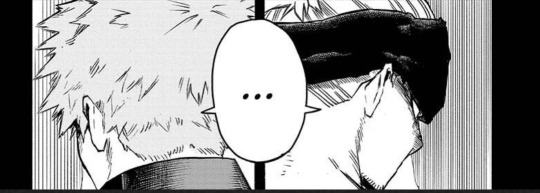
Bruce was also the one to start talking, while Kudo just kept quiet.
He actually communicates a lot
When Yoichi called them to support Midoriya, Bruce started talking to paint a picture of why they thought the way they did, so Yoichi understood where they were coming from.
(Though he seems to beat about the bush sometimes, since Kudo spoke up to be direct on how they couldn't just put their trust in some starry-eyed teenager. Plus, when Kudo tells him to just tell him what's wrong [double Factors])
When Midoriya first used Fa Jin against Nagant, Bruce came out just to tell him he knew what he was trying, but that Midoriya wasn't ready; and Midoriya found he was right. Midoriya just didn't want to listen to him then.
He asks Kudo for clarification after finding Kudo had two Factors in him after the sewer incident ("Just to be sure, All For One didn't touch you, right?") Kudo knew him well enough to go "stop beating around the bush and tell me", so Bruce was probably gonna start with questions, theories, and trying to understand everything in general, before saying "yeah you have two Factors. Don't know why".
Is strong-willed and loyal.
He followed Kudo, even to death, carrying on the cause he started until it ended with him.
Plus, when talking about how AFO needs a strong will to override OFA's own, we first see Bruce, Kudo, and Yoichi.
AFO couldn't steal OFA because the will was too strong for him, and that was back during Banjo's time. Since Shinomori never actually tried opposing AFO and just hid, we can assume the first Three (Yoichi, Kudo, Bruce) already had an accumulation of strong willpower that made OFA un-stealable. Those three are a strong enough foundation, and the main wills, that the other users just become bonuses.
Kudo, also saying that Midoriya needs allies with the same will and drive as him... hey Kudo, you're talking about yourself and your old allies, aren't you? That's why you look at Yoichi and Bruce when you say this.
Not only is Bruce attractive, but he's got good character. THE END.
#yes this is a bruce appreciation post#am i biased? yes. am i right that he has these features? also yes.#hes actually a very attractive person. hes got all the right features for it#plus hes smart (some medical knowledge) is really loyal strong-willed and patient#he puts up with kudo SO much#from being bossed around to taking home yoichis brother to whatever the heck kudo made him do to figure out OFA's transfer properties.....#i didnt think much of bruce originally#then i started doing resistance fic stuff and now hes a fave#hes a little blorbo#that i throw in terrible situations for my own entertainment#used his scary smile for comedy purposes#like when he made a kid cry once. or when a meta child was afraid of him so they bit him#has patience to deal with kudo and co. but also. has enough bite to snark them. is how i like writing him#oh? background character? well lemme just *picks him up* EXPAND ON THAT-#fic stuff: he tries making a good impression on a girl and kudo is ruining it immediately#he doesnt know what to do because the two always banter#kudo: fuck you#oc: fuck me yourself you coward#he sees through a rose-lens that kudo is trying to rip off his face#appeciation kinda turned analysis in general#bruce#kudo#yoichi shigaraki#bnha#mha#spoilers#boku no hero academia#my hero academia#NOT YOICHIS BROTHER. i meant Yoichi / AFO's brother in a prev tag up there but theres too much tags i dont wanna rewrite to fix that#(image limit and tag limit)
302 notes
·
View notes
Text
Making sense of love for love's sake: the game
Despite all the things i absolutely adore about how the plot unravels and expands in love by love's sake, upon first watch, there's some things i couldn't piece together, which @lurkingshan echoes in their post:
'The way the author was messing with Myungha and forcing cruel choices on him really does not track with a desire to help him find happiness.'
And to preface, this is not something i fully get yet either. I think i'll need a good month and a sizeable reading list of relevant resources to understand just what/who this author/sunbae is and what his role is and how he is associated with myungha. But as always with the best shows for meta (aka bad buddy), as a plot unfolds, you can always find a better understanding by looking backwards and re-contextualising what you've already seen. so i watched ep 1, specifically the scene between myungha and his sunbae at the bar. And i will talk about how everything said in this scene has a whole new meaning now we know the full story, but for now i wanna focus on that question that they keep coming back to; "Then... will you change it for him?".
When you watch the show for the first time, your brain follows the simplest, most obvious version of the story you're being told, one where myungha has been pulled into the world of his sunbae's novel that's being turned into a game and given the opportunity to fix the thing he didn't like about it; making yeowoon happy, and thus you just think the rules of the game are imposed by the author, and so when these cruel choices first come up, you see them as the difficult roadblocks that are nevertheless necessary to any kind of game, forcing the player to make an impossible choice so that the game can continue in a certain direction and its only after that you learn whether it was the right choice or not, or there is no right choice, it simply changes the game you are playing.
And when its revealed what this game actually is, at first i tried to interpret these cruel choices, namely the choice between yeonwoon and myungha's grandma, and at best i could come up with the concept of this being a choice between staying stuck to the past aka choosing his grandma, even though he knows that choice doesn't mean she's safe bc he knows the future where he loses here, its an inevitability, but thats the small happiness he knew before it was taken away and thus that happiness is known and safe, theres no risk, versus choosing to pursue a new happiness, a love of yeowoon and thus himself, which he doesn't know, he hasn't experienced yet, and could be risky. Its a happiness that isn't guaranteed like his grandma, but its a happiness that looks to the future and has hope in it that he can find a new happiness to pursue despite what has happened in his past.
And that fits nice, okayish. But then i watched ep 1 and heard that question "Then... will you change it for him?" And watching through the rest of the eps, we come back to this scene at the bar and each time we get a new run up to the author asking this question, either new dialogue is added or we hear a different piece of the conversation entirely. It starts at the beginning of ep 1 as:
"Because Cha Yeowoon is the only one who's miserable."
"It can't be helped that some people's lives are like that"
"The fact that some people are destined to live that kind of life is what's vile."
Then a bit later in ep 1 we go back and its expanded.
"It can't be helped that some people's lives are like that"
"The fact that some people are destined to live that kind of life is what's vile."
"Why? Do you think you'd write it differently?"
"Yes, definately. Someone like Cha Yeowoon, or someone like me with an awful life, can also be happy."
And then all the way on in ep 6, we get this new dialogue.
"I don't like talking about destiny."
"Why?"
"Because it means everything is predestined."
"Then do you not believe in fate?"
"Fate and destiny are the same. My grandma likes to say that. She said life is like a written book, and how you'll live and die are written in it. (...)I don't like things like this. Even if fate is already destined, I think it can still be changed. Otherwise, there's no point in trying."
"Really? Then Myungha..."
And while we don't hear the author ask the same question, I feel like him getting cut off like that insinuates that the conversation leads to that same ending point. All that is to say, every time we hear this question being asked, its like we learn more and more about what this whole thing is, what the game is, what myungha is saying he will do by agreeing to do what the author asks. And every time, we see myungha being more defiant against the idea of yeowoon being resigned to his miserable ending. He starts off thinking that kind of life is destined, and while it's miserable, its not something he can fight. Then he says he'd want to write the story differently, bc yeowoon, or even him, could be happy. He challenges the idea that yeowoon, and thus himself, is fated to be miserable, and opens up the possibility for happiness for them both, but doesn't yet have the means or resolve to do it, its like he knows its possible on a fundamental level, but doesn't see it as something he can actually achieve. But then we circle back to the idea of destiny and books, both of which came up in the previous quote, and seems incredibly pertinent seen as this whole thing is about a novel this author has written. Myungha talks about how he hates the idea that life is a book where everything written is predestined to happen, from the moment you live to the moment you die. He says "Even if fate is already destined, I think it can still be changed. Otherwise, there's no point in trying." That vile way of life he described before that he said was destined, he is now saying it can be changed, and that possibility is now something he's holding onto, its what he sees hope in so that he can keep trying, bc now he finally is trying, he has the resolve, he's trying to realise this thing, this impossibility of rewriting the life he thought was destined through the way he loves yeowoon.
And coming back to those cruel choices, given this fresh context, it made me think. bc this isn't actually a game that myungha has been put into where the rules are dictated by an author completely separate from him. He said himself, he'd rewrite it, he'd change things for yeowoon. And when you start to think of it less as him fighting against a rigid, removed system and more like him being a character in a story he is trying to rewrite himself, that has both the author and his own limitations, or just his own if you're in the school of thought that the author is some figment or part of myungha himself or his conciousness, then you can start to see where these cruel choices might come from. They could be myungha, the author making edits to this new story, imposing his own doubts and limitations on himself. When he says he has to pick between Yeowoon and his grandma, what if that's the new author myungha seeing this story unfold and thinking no this isn't right, he can't have it all, i'm not deserving of this much happiness.
And what makes me like this idea even more is that when we get that second choice between ending after 14 days or getting 100 days back at the cost of resetting Yeowoon's affection to 0, that whole conversation happens in what I think the bar actually is which is this frozen moment in time where myungha is in the water with this extension of a voice in his head that is talking through these things. That conversation in itself needs its own post, but when you look at it both as a decision to break up or not or a decision to hold onto life or not, you can see how the author is just this soundboard relaying the decisions myungha is going through in his head. The author's voice is his own, weighing up his decisions. And if he is the author here, it only reinforces that the person making the rules of this game is him. You can even extend it further to the idea of the debuffs, where he puts in place this thing that makes it so he causes harm to yeowoon when he's around, and its only by garnering affection that he can prevent it. He gives himself a reason from the get go to stay away from yeowoon and reason it as him doing it for yeowoon's safety, when in fact the only way to make yeowoon safe is to increase his affection, which he can only do by being near him. Its a system that at first gives myungha a reason to stay away aka not like himself, but ultimately says the only way you're going to make yeowoon like you, or the only way you can like yourself, is if you accept risk. And that in itself screams to me of a myungha writing in these game systems that are trying to encourage his own-self love while falling at the hurdle of his own lack of self-worth.
The idea is still messy in my head even for me, but i just really like the idea that myungha could be trying to fix this thing both as a character and game master, and that both these versions of him have these flaws that manifest in their different ways to cause the events we see. It kinda is the definition of being your own worst enemy, the idea that in order to work towards loving yourself, the biggest obstacle you have to encounter is yourself, bc we are the ones holding ourselves back, making all these rules that make it harder to like ourselves and pursue our own happiness. The voices in our head telling us that we aren't good enough and aren't deserving are our own, and while the things that happen to us can inform what they say, we're the one's reinforcing those words. And what this show teaches us is that, if we're the one holding that pen all along, we can choose to change what those words are. If we make the rules, you don't have to create a game with concrete ultimatums, you can create a game where rules don't control you. Instead, you make the decisions, and you can make the ones that make you happy.
#wow look at me writing actual kinda thought out meta#also something something about how the pen being in his pocket wasnt a pen given to him by the author its a pen that was his the whole time#look even if this isnt the right interpretation as intended by the author i just kinda adore this headcanon ive come up with and i cant wai#to rewatch the show again through this lens and see if it holds up#i just adore the idea of this whole thing being this manifestation of a flawed doubtful person trying to navigate through their own messy#nonsensical thoughts to find their own happiness#bc yes thats what triggered me thinking of this whole thing. me seeing that post and thinking yeah that doesnt make sense7#but then again when you tell yourself things an put your own mental blocks in the way they dont make sense either but you still have to fin#the ways to work around them in order to find happiness#like those things dont go away we just find the loopholes or the ways to overcome them that mean we can be happy#the game is your own mind - deal with your own existential crisis as you wish#anyway this is only part 1 in what i hope will be a very extensive meta analysis of this show - stay tuned#love for love's sake
212 notes
·
View notes
Text
teaching my sister the concept of a critical lens by making her rewatch house md after informing her of the hilson ship
96 notes
·
View notes
Text
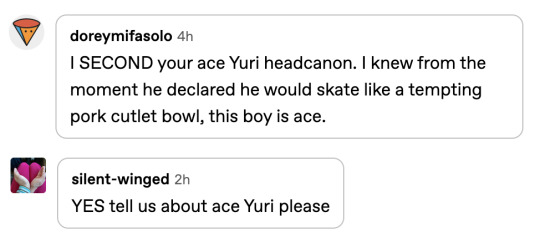
ok I am in fact using this as an excuse to make a long post about this thank you thank you asjksdjfaljdf
---
Interpreting Yuri as asexual is my very very favorite type of headcanon, which is one that 1. is compellingly coded in the source material (even if that wasn't the creator's intent), 2. is thematically relevant to what the piece of media is Trying To Do as a whole, and 3. just means a lot to me, personally, because I said so.
Coded in the source material
Yuri’s short program is “eros”, aka desire (you can interpret what “eros” means in various ways, but YOI itself explicitly refers to sexual love, at least in the English translations). Yuri struggles with this. Hard. He can’t come up with an answer when asked what eros means to him. His big revelatory moment about desire is that it’s how he feels about wanting to eat his favorite food (omg… boy). Even as the season goes on and the way he views the Eros program changes, the program doesn’t ever really embody the idea of eros as sexuality or romance (which was how the other characters expect him to interpret it) but rather as a desire to keep Victor in his life.
Like look. I’m obviously not going to say that the creator intended any kind of ace subtext to be there. I kind of doubt it was her intent. But goddamn is the subtext there.
2. Thematic relevance
The central theme throughout YOI is “love”, and especially loving people in a way that inspires you both to be your best selves: Yuri learning that the people in his life truly love and support him; Victor finding someone who makes him feel joy about skating again.
Like, Yuri’s whole skating theme for the Grand Prix is literally about him exploring what love looks like to him, even when it takes a form that other people don’t totally understand. Viewing all this through a lens of him being ace is really compelling. It adds depth to the idea of learning how to express the way you feel love even when it looks different than what other people expect. I think it’s a really delicious layer that adds even more nuance to what the show is getting at.
Besides, it’s an interesting way of viewing the criticism of the show that occurred for it not being 100% explicit about them being a couple (aka people getting mad because the kiss in ep 7 is blocked by Victor’s arm lmaooo). Like, ok, did you see the ending scene of ep 9? Did you see ep 10??? They definitely, definitely love each other, in whatever way that means for them. Their relationship takes a form that’s pretty different than the other way people in the show are going about romantic relationships, but that doesn’t mean it isn’t real for them. That is very much in line with the main themes of the show.
3. Means a lot to me
In the final scene of the penultimate episode, Yuri tells Victor that they should end their coaching relationship after the Grand Prix ends. This is because he thinks he’s holding Victor back, that Victor would be happier being free to go back to skating on his own instead of being Yuri’s coach. When I watched this (and, I’ll be honest, this is completely me projecting here) I REALLY interpreted this as an ace thing. I think it’s pretty easy to internalize the idea when you’re asexual that you just won’t be… enough, for other people. In my case I ended up a strong impulse to self-sabotage relationships because I would rather be the one to end things than to let someone else tell me that who I am as a person is fundamentally lacking. Yuri destroying a connection he desperately wants because he thinks there’s something about him that is holding Victor back from a life he’d be truly happy with? Oh yeah. I can fucking relate to that.
Also: YOI came out in 2016, which was the absolute peak of hostility to ace people I was seeing on this site. It was bad here. At the same time Tumblr was going wild over this show. Everyone was watching it. Seeing a whole site of people absolutely adore a character I very deeply in my heart believed to be ace? Extremely vindicating.
---
In conclusion Yuri is asexual because it is fun and interesting that way, and also because of this:
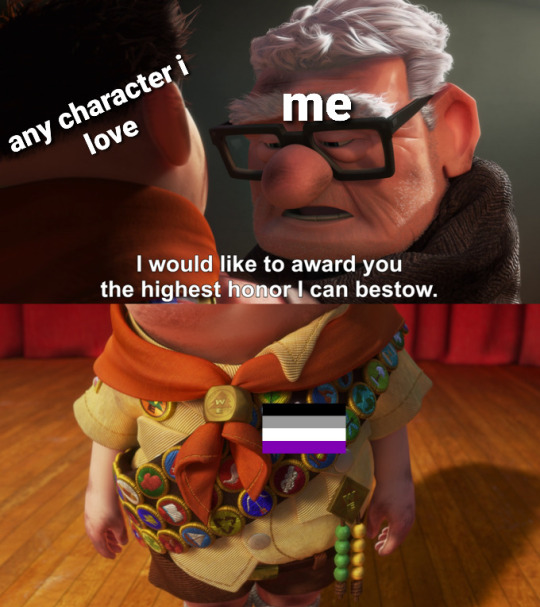
#like it adds so much to the show if you view it through this lens! it's really good!#same reason for why I hc zuko as gay like ->#yeah ok you don't *have* to see it this way... but don't you want to live deliciously (in your media analysis)???#yoi#yuri on ice#thank u for giving me the excuse to finally post about this lol this has been building in my head for literally the last 8 years
120 notes
·
View notes
Text
I think the most interesting thing to me about 50 shades so far is the way James very nearly mimics the voices of Meyer’s characters while completely failing to mimic the real chemistry that Edward and Bella have.
Edward and Bella are, fundamentally, deeply horny with no capacity to conceptualize, let alone express it. It’s that horniness—derived from the eroticism of danger and the unknown—that draws them together, and it’s that horniness that fuels what becomes their mutual obsession.
But by disposing with the mystery of Edward/Grey’s nature and by turning his obsession with Bella/Anastasia into something derived from pure sexual desire (instead of vampiric hunger), James eliminates the erotic tension that Twilight—much as it couches it in metaphor and three layers of allusion—very much does have!
Grey, we are told, is hot. Anastasia, we are told, is attracted to him. But there’s nothing anchoring these facts except (dubiously) their first conversation, which certainly sounds like Edward and Bella's, but has none of the underlying tension.
If there is sexual tension there, it’s the sexual tension of a pair of disembodied tits and dick in pornhub video. There’s nothing erotic about it.
#I’m SURE someone has analyzed 50 shades through the lens of twilight before I know I’m not saying anything groundbreaking#but. sometimes it’s not about the analysis it’s about the process of analyzing#fifty shades of grey#twilight
150 notes
·
View notes
Text
I've been an apologist for all of the pilgrims, but even by today's standards there's something so refreshing in how unsparing and blunt Journey to the West is when it comes to laying out those funky dudes' various atrocities.
#journey to the west#jttw#xiyouji#got to thinking again about how tang sanzang got the guys who assaulted his mom tortured to death#as you do#anyway#everyone say thank you to wu cheng'en for clearly having favorites#but also not letting said favoritism blunt his descriptions of where they went full evil and why#man#idk if such a thing is out there#but i'd love to see an analysis on jttw through the lens of horror
74 notes
·
View notes
Text
in order of least to most galaxy brain:
loki has npd because he's evil
loki does NOT have npd because he's NOT evil!!! he's just traumatised and compensating for his self-loathing. thor is evil, he can have the npd
loki has npd because npd IS a trauma disorder which compensates for self-loathing
loki doesn't have npd because his npd traits are too superficial and unstable, but he has bpd with narcissistic traits
loki does have npd (and bpd) because the diagnostic criteria for npd are unreliable on account of their bias against the patient; if you read first-hand accounts you find a much more nuanced picture of the illness
thor is not evil. and he has bpd with narcissistic traits
#space viking tag#yeah still thinking about this#i'm not like HUGE on diagnosing characters (and i reserve my right to change my mind again)#but i do find specific diagnoses to be an interesting lens for character analysis#and also interesting as just. a phenomenon. human emotions#hmm#meta#lens: modern psychiatry#ch: loki#ch: thor
148 notes
·
View notes
Text
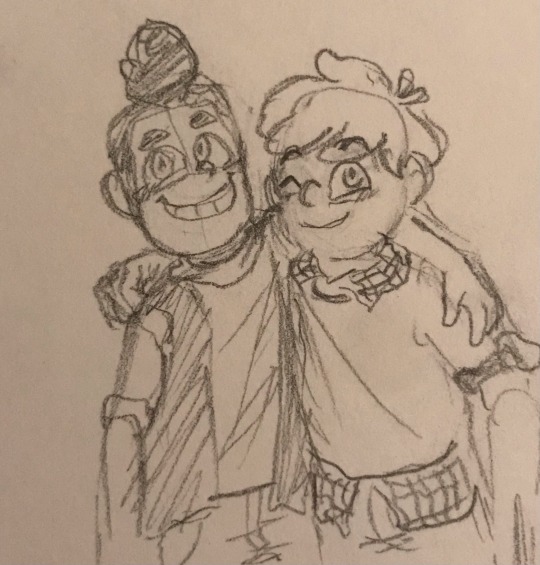
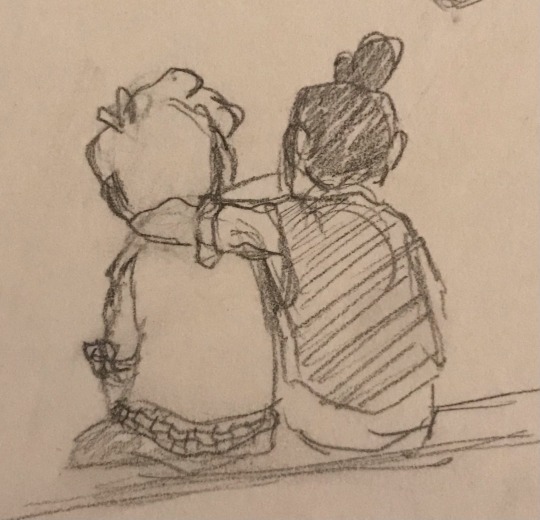
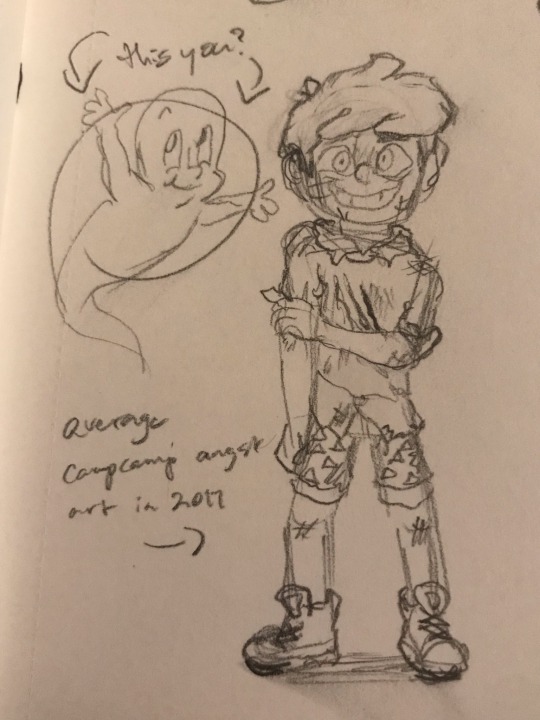
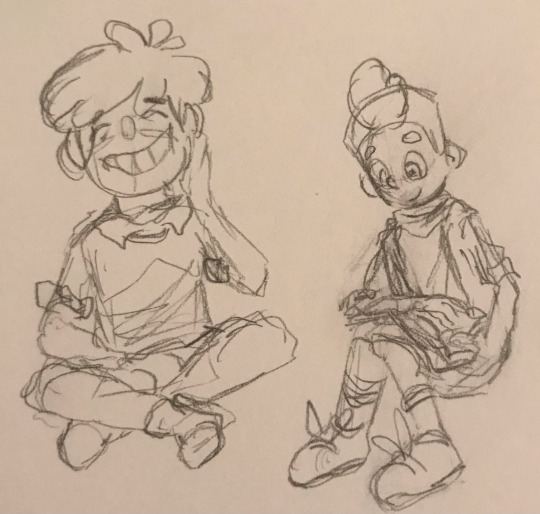
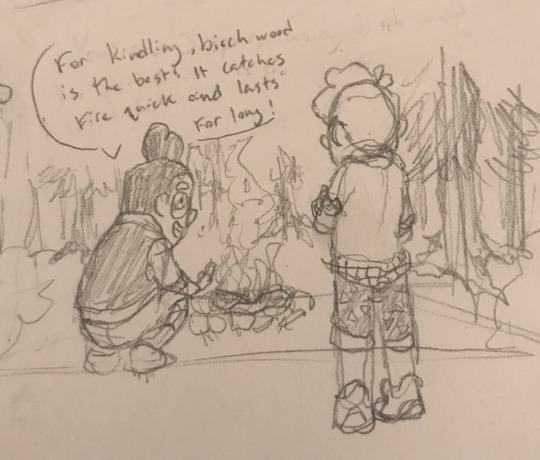
thinking about their friendship so hard
#camp camp#cc#David#jasper#fanart#DUDEEE nobody gets them like i do theyre so good#theyre so tragic.. they never truly got to know each other. the last time they ever seen each other they were angry with the other :(#but there’s so much regret that comes with it too. they never got to talk it out. be on good terms#they could see each other at any moment but they other doesn’t know#they call each other best friends yet we never really see them being best friends.. but maybe they get each other like no one else does#their personalities did a complete swap with each other - they understand how the other is thinking and feeling.#David hated the camp but after one good thing he loves it. viseversa with jasper#when they last saw each other they were clouded with their views and didn’t try to understand things from their lens#yet even if they didn’t - they still understood each other. if you get what I mean#theyre foils. but so is max and david and that’s what makes both relationships compelling for me. theyre so similar to each other#no wonder david is so attached to max. he sees himself in him and he sees jasper in him too#i know jaspers just a character to show how bad the camp is. but there’s so much depth to him too#he has a lot of missed potential.. i hope he’s in season 5 at least. id like to see him again#srry for the character analysis im insane#jaspvid
64 notes
·
View notes